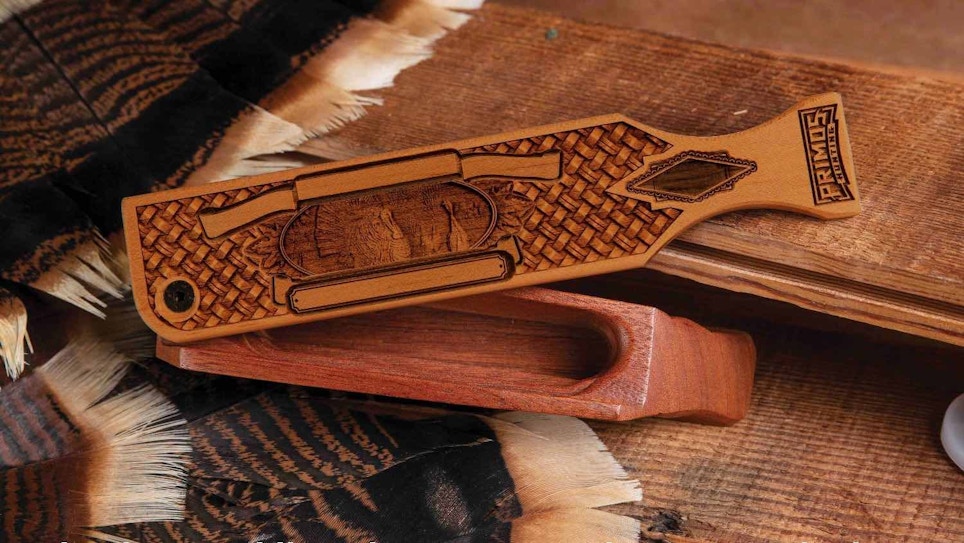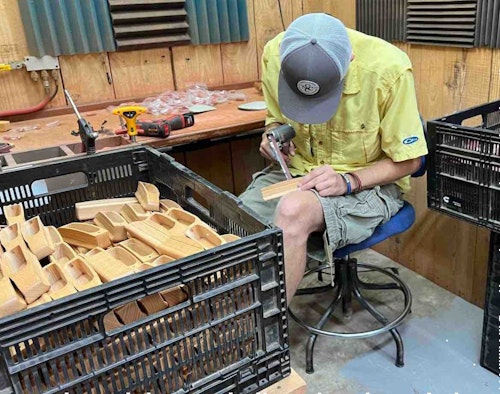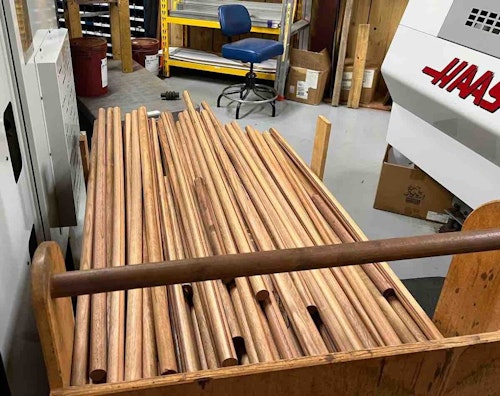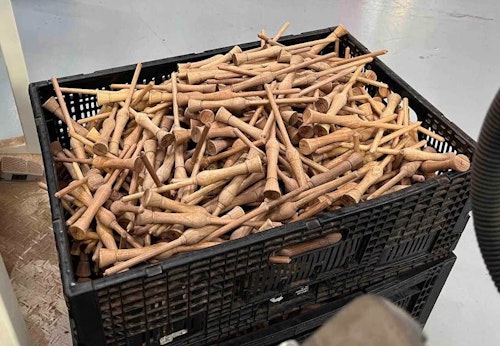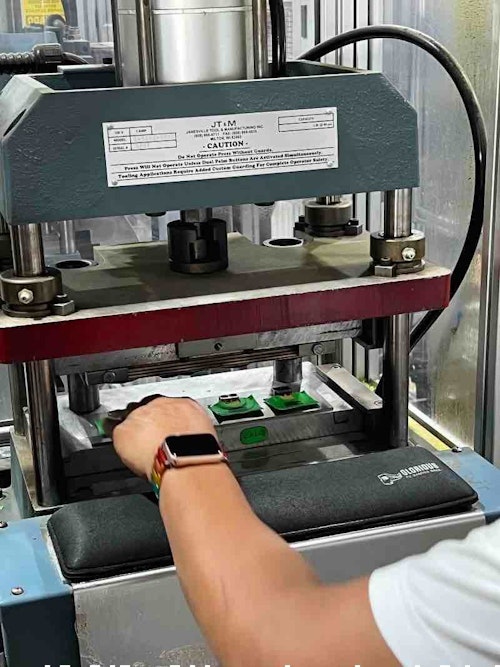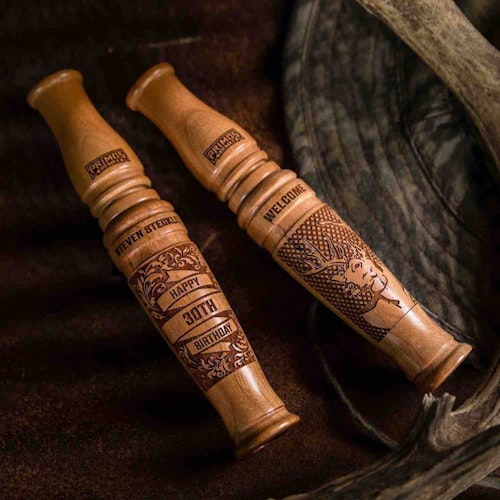In a rural part of southeast Mississippi, the legacy sparked decades ago by Uncle Gus and Eleanor Roessler lives on in a nondescript wildlife call-making facility where men and women produce more than 1 million calls each year.
If you’ve never heard of Uncle Gus and Eleanor Roessler, don’t worry. Not many people dive that deeply into the Primos Hunting website or know its history. Company founder Will Primos caught the hunting bug early in life thanks to family and friends. He began building his own calls at age 11 after hunting ducks with Uncle Gus in the Mississippi flooded green timber. Years later, Primos was taken under the wing of Roessler, who owned a turkey hunting camp and made her own calls. Primos began making his own turkey calls, word got out, and eventually things hit overdrive with popularity, sales and the company’s growth.
Today, Primos Hunting is more than game calls. The company sells calls, of course, along with hunting blinds, shooting sticks, food plot seeds, minerals, feed and hunting accessories. It has a custom mill shop; if you want deer or turkey calls, boot pullers or Euro plaques, they can create it. Over the years the company’s “The Truth About Hunting” shows were, and still are, highly acclaimed. The Primos team shifted with the times, moving from television and videos to today’s online presence. The marketing logo “Speak the Language” rings true, given the number of calls Primos has turned out for more than 4 decades.
Today, Primos is part of the Vista Outdoor group, purchased years ago and tucked into the conglomerate’s 32 brands. Some are hunting brands. Others are recreational sports, or lifestyle such as Camp Chef. Blackhawk! is another, for the tactical arena. Primos is one of its top hunting brands, owing its success to myriad reasons. One of them is its culture, a popular term tossed around by a lot of upper level managers in big and small businesses.
The difference with Primos and its Brookhaven plant, however, is its culture didn’t change from when Will Primos founded the company.
“For us, what we do is a job and for some of us it’s a true career, like myself,” said Director of Product and Marketing Jason Harris. “But we do it because we want to do it and love it. We take a lot of pride in what we make and how we make it. We’re diligent about employing people on our team who have that same mentality. When you have people working together in unison with passion for what they’re doing and doing what they love, the end product always comes out better.”
Where Is Brookhaven?
Take a look at a map of any state and you’ll see scads of small towns and communities. Mississippi is no different, with Brookhaven being one of those small towns. If you’re in the capitol of Jackson, you’d head about 55 miles south and hang a left. You’re in Brookhaven, population 11,700, named after a town on Long Island by transplanted New Yorker and founder Samuel Jayne. Brookhaven is a quiet town with summer festivals, a quaint retail area and laid-back attitude.
Then, to get to the Primos CNC facility, you need to go for another drive through the countryside southeast of Brookhaven. There’s nothing there but homes, woods, fields and a few big chicken breeder houses. As Harris says, “It’s in the middle of nowhere, a good 20-25 minutes from anything.”
In that middle of nowhere is where the Primos game call facility is located. Along with the stacks of colored acrylic rods for waterfowl calls and different wood for turkey calls, you’ll find CNC machines and 3D printers, wood cutters and routers, computers and a fluctuating number of workers who produce about 1 million turkey, deer, waterfowl, elk, crow and predator calls each year.
CNC stands for computer numerical control. This computerized capability helps ensure uniformity with whatever material is being manipulated by the machine. A drawing or specific data, for example, is plugged into the computer. With that information, the machine creates a part or product from wood, polycarbonate, acrylic or other material.
Consider a turkey paddle box call, for example. It has a thin lid with a flat side and rounded side, and a bottom with a noise chamber. The CNC machine ensures the lid’s rounded side is uniform, as is the depth, length and width of the sound chamber in the bottom. The parts are cut from blocks of wood and precisely routed, drilled and etched before being hand-finished, tuned and packaged.
“There are not many, if any, large-scale call companies operating anymore at this level other than Primos,” said Derrick Nawrocki, publisher for Grand View Outdoors and Archery Business. Nawrocki toured the Primos facility last spring. “It’s truly a great story about the Primos brand that is corporate, but resists the corporate culture by keeping this manufacturing facility family oriented and in how they produce calls. The shop is a true mixture of hands-on craftsmanship combined with modern day technology methods, including many custom applications to build calls.”
True custom work can’t be done on the mass scale needed to meet the demand for Primos calls. Churning out products that maybe need only one assembly step and packaging doesn’t cut the mustard for them, either. They’re not going to outsource it overseas, either. The existing setup of machinery for milling and cutting, and the hands-on assembly, finishing, tuning and packaging, is the best of both worlds.
“We utilize modern technologies to ensure consistency, but everything is hand-assembled and hand-tuned,” Harris said. “Pretty much everything in the turkey call line is made there from scratch. We source some components, such as a glass-maker we buy from domestically, or the slate, and then we manufacture and assemble there.”
Harris said some components are injection molded “by partners all over the United States.” The parts are created to the Primos specifications, and then finished, assembled and packaged in Brookhaven. All the calls are checked and tuned. Anything that doesn’t sound or look right gets tossed in the rejection pile.
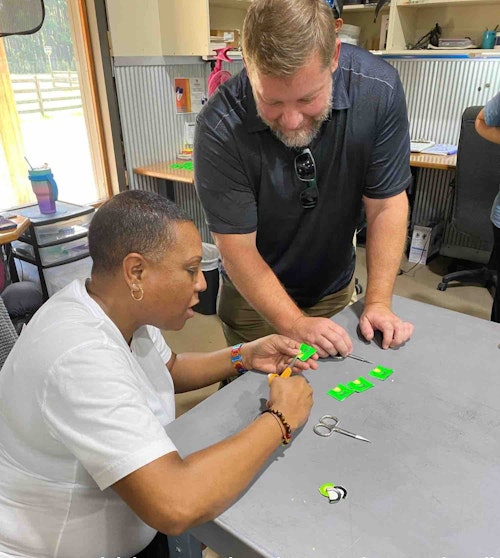
What About Culture?
When hunting season rolls around, the facility can be a ghost town some days. Deer hunters will be in the woods, duck hunters on the water or in the timber, and maybe a few employees will be catching bass or on the coast chasing saltwater redfish and trout. But the production rolls on, ahead of the current season to be ready for the upcoming seasons.
That was one of the things Will Primos did back in the early days. To sell turkey calls for spring turkey season, he had to make them months ahead to ship. The same holds true today. Striving for excellence making calls that would be used 5 or 6 months later is part of that culture Harris said continues today. Part of that involves a family atmosphere where everyone pitches in, picks up some slack, maybe works a bit extra if someone is out or needs to leave early.
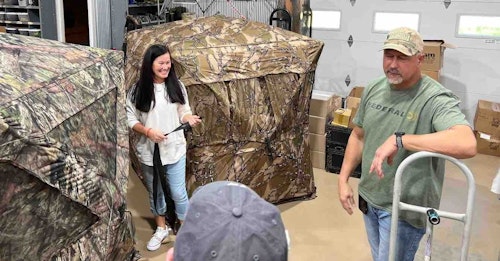
“Will, many years ago when he founded the company, installed a sense of family as part of the culture,” Harris said. “We’ve been able to maintain that. We treat them like family, engage with them in and out of the office, and because we hire people with same thought processes and passion and common threads, we can operate more like family and close friends instead of just showing up at 8 a.m. for a job.
“I believe when you treat employees like family and with respect, they treat you the same way. When we get there on Monday morning we’re talking about our weekend, our family events, our hunting or fishing trips or whatever else we did over the weekend. I know all our employees’ families’ spouses, kids, what’s going on in their lives, and I think we’re better off for it.”
Remote work and work-from-home are hot topics today in the business world. Production facilities can’t get goods created and shipped without people being in the facility producing and shipping those goods. Harris said if someone needs to time for family or personal business, it’s not a big deal. The team adjusts and things keep flowing.
“We as a country and world have learned to work remotely and trust employees to get job done when they can’t come to the office, and that’s a cultural change,” he said. “But as well as being a family business we empower our employees. Will was doing that years ago. When you have people who are willing to put in extra hours or effort, then being able and willing to bend and flex makes a difference. We’re fortunate enough that we work in a space — the outdoors industry — that revolves around a passionate, common thread. And at Primos, we’re lucky enough to always to have been able to find the right people to fit in with the team.”
